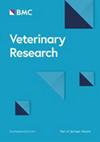Swine acute diarrhea syndrome coronavirus Nsp1 suppresses IFN-λ1 production by degrading IRF1 via ubiquitin–proteasome pathway
IF 3.7
1区 农林科学
Q1 VETERINARY SCIENCES
引用次数: 0
Abstract
Swine acute diarrhea syndrome coronavirus (SADS-CoV) is a novel porcine enteric coronavirus that causes acute watery diarrhea, vomiting, and dehydration in newborn piglets. The type III interferon (IFN-λ) response serves as the primary defense against viruses that replicate in intestinal epithelial cells. However, there is currently no information available on how SADS-CoV modulates the production of IFN-λ. In this study, we utilized IPI-FX cells (a cell line of porcine ileum epithelium) as an in vitro model to investigate the potential immune evasion strategies employed by SADS-CoV against the IFN-λ response. Our results showed that SADS-CoV infection suppressed the production of IFN-λ1 induced by poly(I:C). Through screening SADS-CoV-encoded proteins, nsp1, nsp5, nsp10, nsp12, nsp16, E, S1, and S2 were identified as antagonists of IFN-λ1 production. Specifically, SADS-CoV nsp1 impeded the activation of the IFN-λ1 promoter mediated by MAVS, TBK1, IKKε, and IRF1. Both SADS-CoV and nsp1 obstructed poly(I:C)-induced nuclear translocation of IRF1. Moreover, SADS-CoV nsp1 degraded IRF1 via the ubiquitin-mediated proteasome pathway without interacting with it. Overall, our study provides the first evidence that SADS-CoV inhibits the type III IFN response, shedding light on the molecular mechanisms employed by SADS-CoV to evade the host immune response.猪急性腹泻综合征冠状病毒 Nsp1 通过泛素-蛋白酶体途径降解 IRF1,从而抑制 IFN-λ1 的产生
猪急性腹泻综合征冠状病毒(SADS-CoV)是一种新型猪肠道冠状病毒,可导致新生仔猪急性水样腹泻、呕吐和脱水。III 型干扰素(IFN-λ)反应是抵御在肠上皮细胞中复制的病毒的主要防御手段。然而,目前还没有关于 SADS-CoV 如何调节 IFN-λ 产生的信息。在本研究中,我们利用 IPI-FX 细胞(猪回肠上皮细胞系)作为体外模型,研究了 SADS-CoV 对 IFN-λ 反应的潜在免疫规避策略。我们的研究结果表明,SADS-CoV 感染抑制了 poly(I:C) 诱导的 IFN-λ1 的产生。通过筛选 SADS-CoV 编码的蛋白质,我们发现 nsp1、nsp5、nsp10、nsp12、nsp16、E、S1 和 S2 是 IFN-λ1 生成的拮抗剂。具体来说,SADS-CoV nsp1 阻碍了由 MAVS、TBK1、IKKε 和 IRF1 介导的 IFN-λ1 启动子的激活。SADS-CoV 和 nsp1 都阻碍了 poly(I:C) 诱导的 IRF1 核转位。此外,SADS-CoV nsp1通过泛素介导的蛋白酶体途径降解IRF1,而不与其相互作用。总之,我们的研究首次提供了 SADS-CoV 抑制 III 型 IFN 反应的证据,揭示了 SADS-CoV 逃避宿主免疫反应的分子机制。
本文章由计算机程序翻译,如有差异,请以英文原文为准。
求助全文
约1分钟内获得全文
求助全文
来源期刊

Veterinary Research
农林科学-兽医学
CiteScore
7.00
自引率
4.50%
发文量
92
审稿时长
3 months
期刊介绍:
Veterinary Research is an open access journal that publishes high quality and novel research and review articles focusing on all aspects of infectious diseases and host-pathogen interaction in animals.
 求助内容:
求助内容: 应助结果提醒方式:
应助结果提醒方式:


